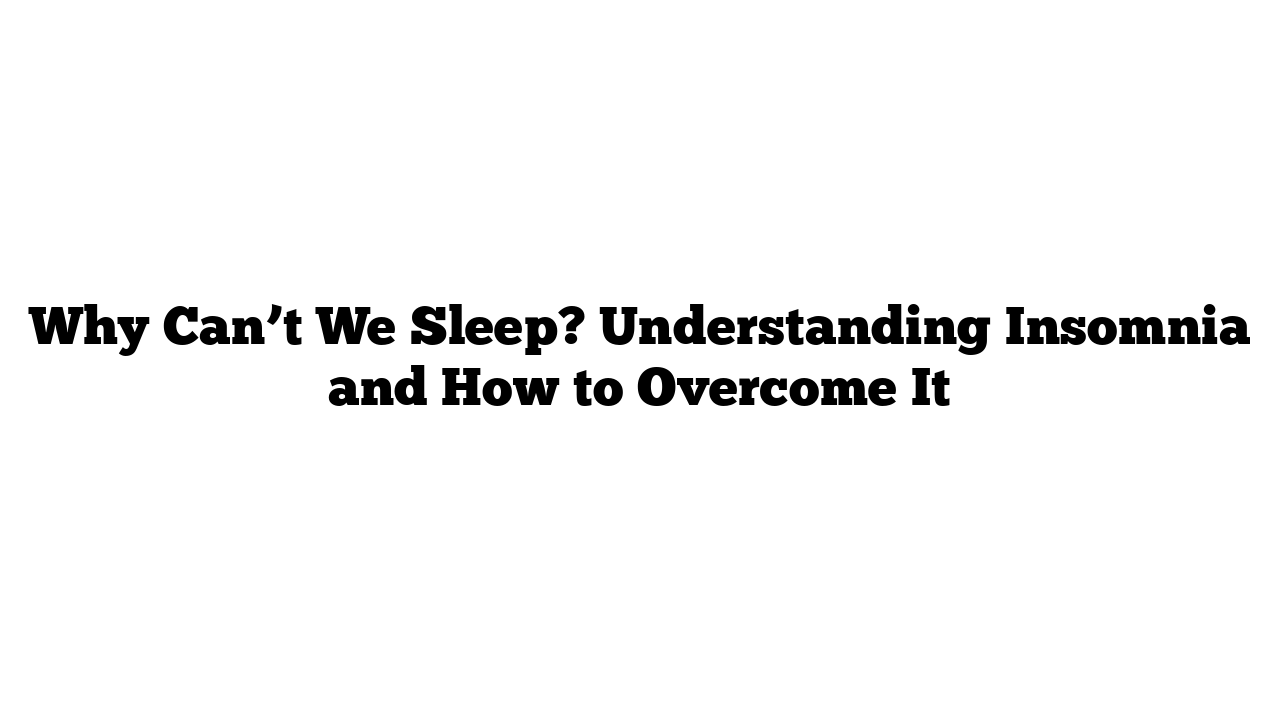Many of us have experienced sleepless nights—whether it’s the excitement of an upcoming trip, an unfinished project, or perhaps an upcoming event that has us tossing and turning. These bouts of insomnia are often temporary, disappearing once the cause is resolved. But what if the stress itself is about not sleeping?
This vicious cycle of worrying about sleep, which leads to more sleeplessness, is at the heart of insomnia, the world’s most common sleep disorder. Let’s explore what causes insomnia, how it affects the body, and what you can do to break the cycle.
What Causes Insomnia?
Insomnia can be triggered by many factors:
- Daily Stressors: Work deadlines, exams, or social events.
- Health Conditions: Physical pain, respiratory issues, or gastrointestinal problems.
- Environmental Disruptions: Snoring partners, room temperature, or even jetlag that throws off your natural clock.
In most cases, these are short-term issues, and we eventually catch up on sleep. However, for some, insomnia becomes a long-term problem, leading to what is known as chronic insomnia.
How Chronic Insomnia Develops
As sleepless nights pile up, the brain begins to associate the bedroom with restlessness. When bedtime comes, instead of relaxing, insomniacs experience heightened stress. This stress activates the “fight-or-flight” response, releasing chemicals like cortisol that increase heart rate and keep the body alert—making it nearly impossible to fall asleep.
In this state of hyperarousal, even the smallest noise or discomfort can feel like a threat, keeping insomniacs alert and awake.
The Science Behind Sleeplessness
When we’re awake, our brains rely on cerebral glucose for energy. Normally, sleep allows our metabolism to slow down, conserving glucose. However, studies show that the adrenaline associated with insomnia keeps metabolism high, even during sleep. This leaves insomniacs waking up feeling exhausted, disoriented, and stressed—starting the cycle all over again.
Insomnia and Mental Health: A Risky Combination
Chronic insomnia doesn’t just affect sleep; it can also increase the risk of anxiety and depression. The stress responses seen in insomnia are similar to those found in anxiety attacks, linking these conditions closely together. In fact, experiencing one often increases the likelihood of the others, creating a cycle of poor mental health and disrupted sleep.
Breaking the Insomnia Cycle
The good news is that with the right approach, it’s possible to manage insomnia effectively. Here are some research-backed strategies to help:
- Practice Good Sleep Hygiene:
- Keep the room dark, quiet, and cool to minimize disturbances.
- Use your bed only for sleep; if you’re restless, try activities like reading or meditating to calm down before returning to bed.
- Regulate Your Sleep Schedule:
- Set consistent sleep and wake times, even on weekends. This helps align your circadian rhythm, the body’s internal clock.
- Avoid bright screens and lights in the evening, as they signal your brain to stay awake. Instead, dim the lights to help your body wind down naturally.
- Consider Medical Support:
- Some doctors may prescribe sleep aids, but use these cautiously. Over-the-counter sleep medications can be addictive and may worsen symptoms if used improperly.
Is It Really Insomnia? A Look at Delayed Sleep Phase Disorder (DSPD)
For around 8% of individuals diagnosed with chronic insomnia, the real issue might be Delayed Sleep Phase Disorder (DSPD) . This condition is not a form of insomnia but rather a mismatch in the sleep-wake cycle. People with DSPD have a circadian rhythm longer than 24 hours, causing them to feel tired later than typical bedtime hours. However, they can sleep normally if they follow a delayed schedule.
If your sleep difficulties are more about timing than sleeplessness, DSPD might be worth exploring with your doctor.
Building a Healthy Relationship with Sleep
Sleep is vital for both physical and mental health. By practicing good sleep habits, managing stress, and finding the right support, you can build a better relationship with bedtime. Consistency and patience are key, so give yourself time to adjust.
For more resources on sleep and health, visit medicaltimes.io. Remember, it’s worth the effort to establish a stable sleep routine—but don’t lose sleep over it.
